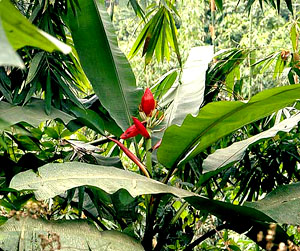 |
QUICK SEARCH
MO PROJECTS:
Africa
Asia/Pacific
Mesoamerica
North America
South America
General Taxonomy
Photo Essays
Training in Latin
America
MO RESEARCH:
Wm. L. Brown Center
Bryology
GIS
Graduate Studies
Research Experiences
for Undergraduates
Imaging Lab
Library
MBG Press
Publications
Climate Change
Catalog Fossil Plants
MO DATABASES:
W³MOST
Image Index
Rare Books
Angiosperm
Phylogeny
Res Botanica
All Databases
INFORMATION:
What's New?
People at MO
Visitor's Guide
Herbarium
Jobs & Fellowships
Symposium
Research Links
Site Map
Search
 |
table of contents |
| The tropics are an evolutionary powerhouse - the most diverse and complex assemblages of plants, animals, and microorganisms on Earth. At least two-thirds of all known plants and animals are found there, and thousands of new species are discovered each year.
How we use the wealth of biological resources in the tropics has a profound effect on the health of our planet. But today these resources are being consumed rather than managed. | ||
| ||
| Tropical forests once covered at least one-eighth of Earth's land mass, an area roughly twice the size of Europe. Currently at least 40 million acres are cleared or degraded annually - an area larger than Maryland, Massachusetts, and Rhode Island combined. If present trends continue, tropical forests will be reduced to fragments - just five percent of their original area - in the next 50 years.
The implications for our world are profound. Once a habitat is damaged or destroyed, the risk of multiple extinctions increases dramatically. As species lose populations, their genetic flexibility - their ability to adapt, to survive climate change, disease, drought or disturbance - is diminished. The consequences for global climate change are potentially disastrous. Once a forest is altered, the area loses its ability to retain moisture, leading to reduced rainfall, and when rains do come, degraded sites experience devastating soil loss and flooding. As more forests are cleared, the sustainability of wider regions is threatened. Worldwide, a decline in tropical forest cover allows more solar energy to be radiated back into the atmosphere, disrupting wind currents and rainfall far outside the tropics. | ||
| Text and photos from "The Unseen Garden" available from MBG Press. | ||
© 1995-2025 Missouri Botanical Garden, All Rights Reserved
4344 Shaw Blvd.
St. Louis, MO 63110
(314) 577-5100
Technical Support
